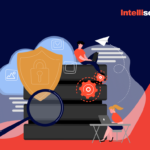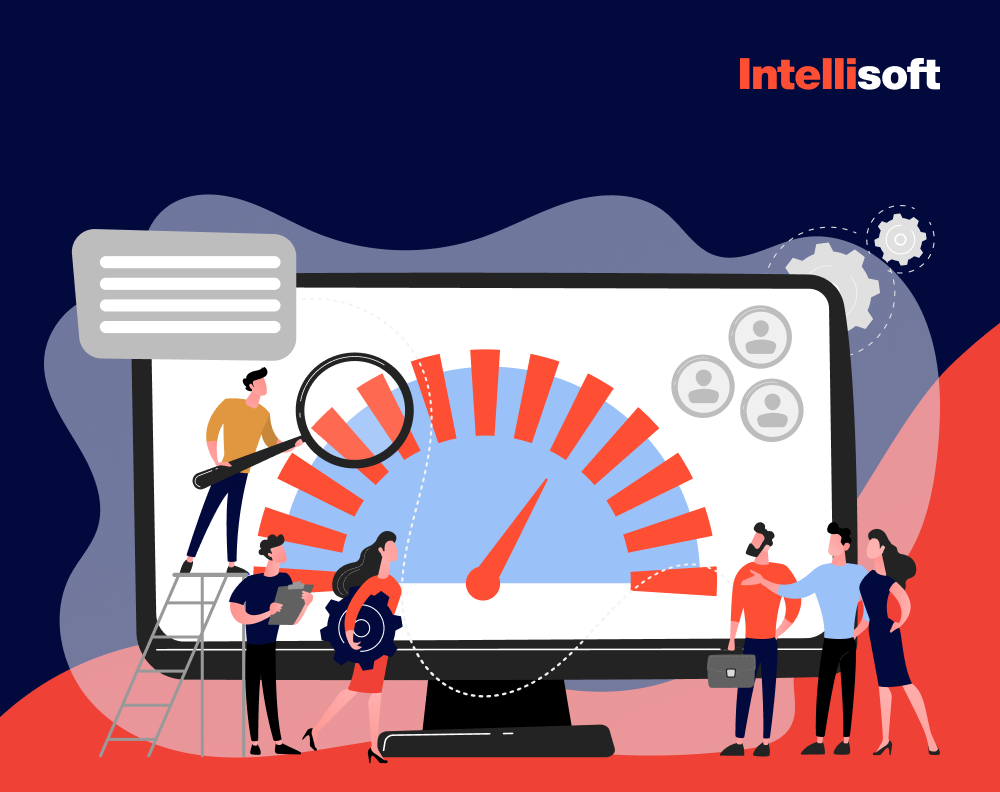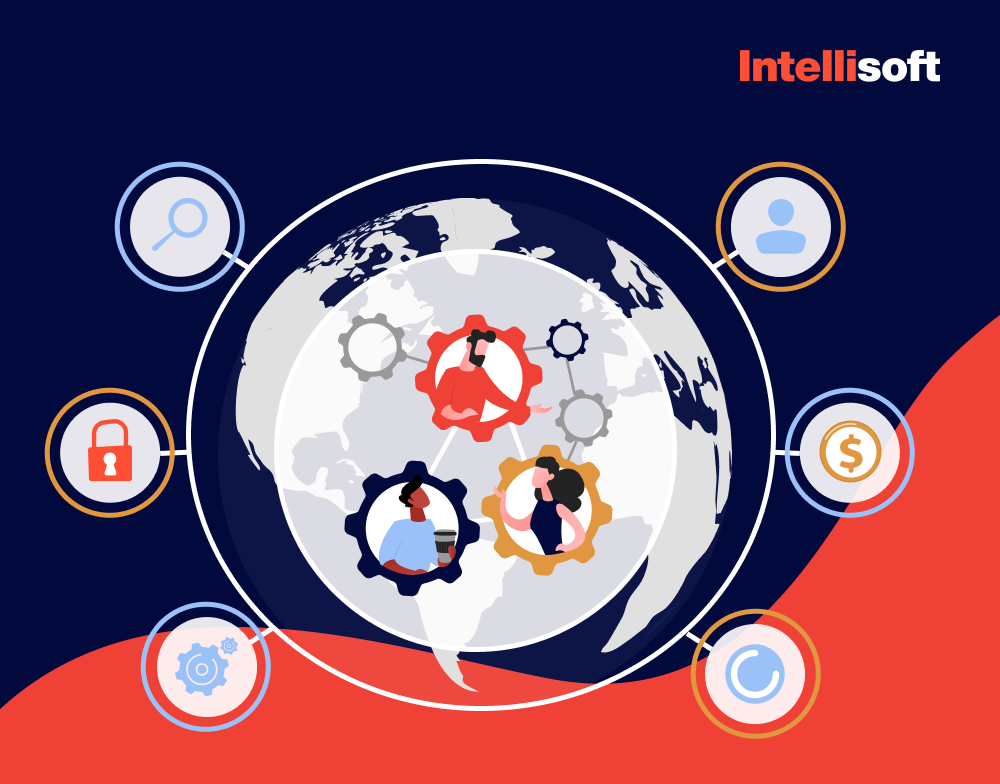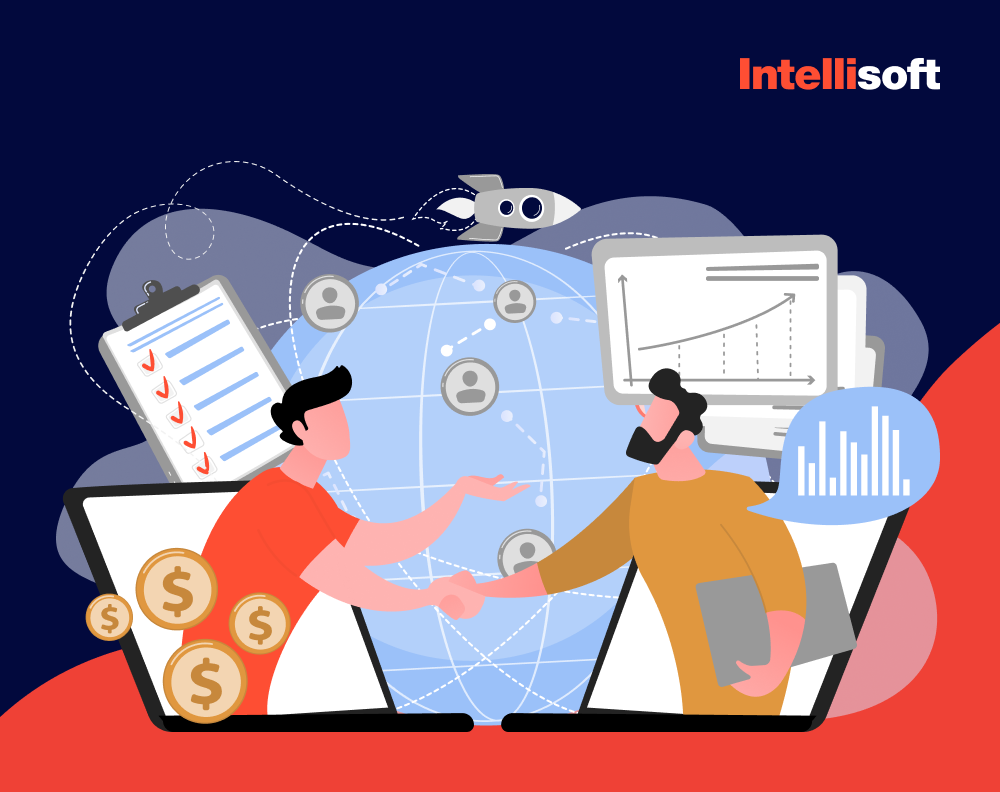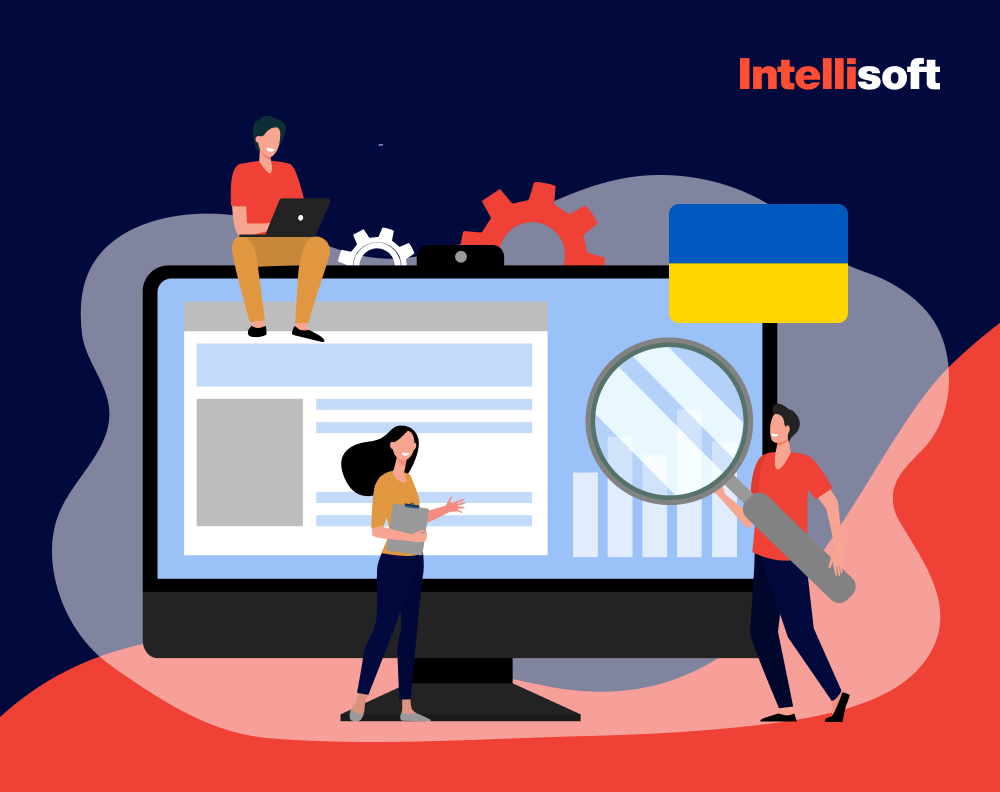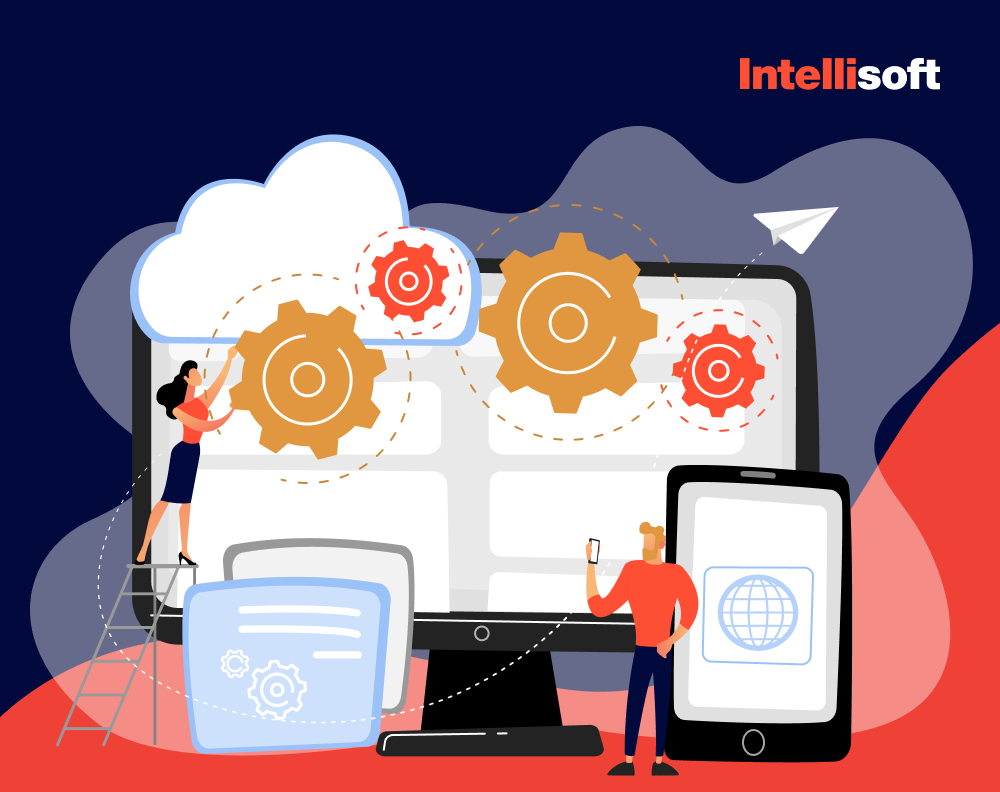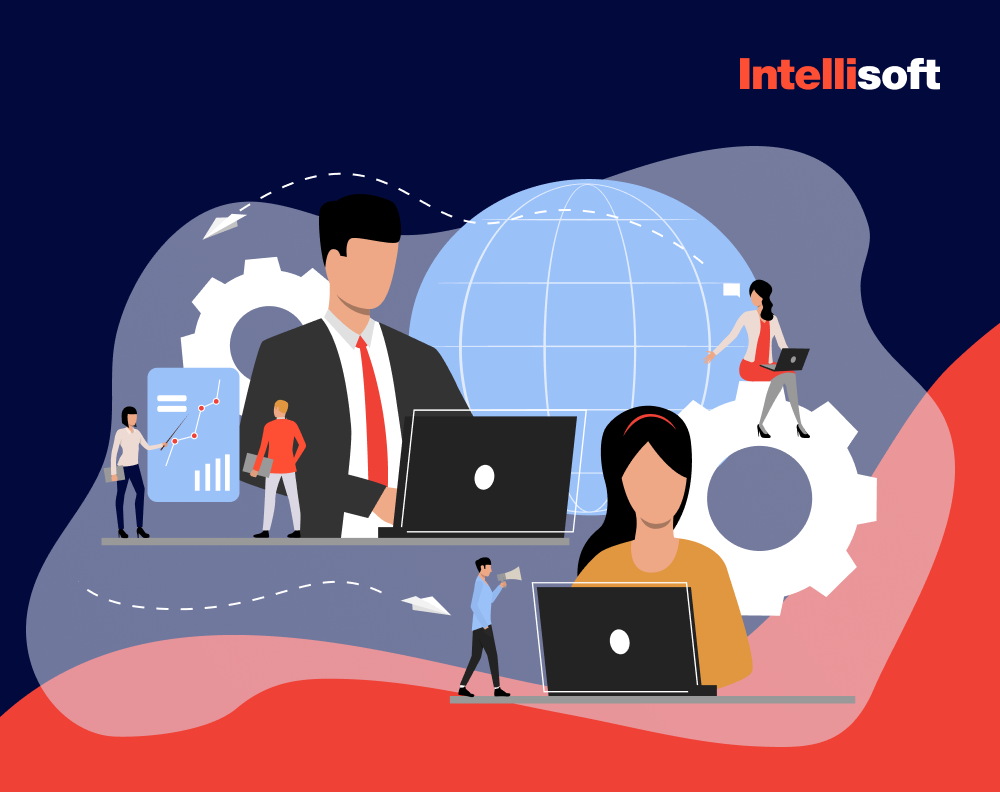These days, people do everything on their phones; communicate with friends, work, study, get acquainted with new people, entertain themselves, and access various services and tools. No matter your business type, building a mobile app is a must, not an option, and mobile app development outsourcing is the fastest and most cost-effective way.
A reliable and experienced outsourcing partner will bring talent, expertise, and the latest technology into your business and bring your ideas to life, tailoring a mobile app to your needs. Being in the outsourcing market for more than 13 years, our IntelliSoft team knows everything about outsourcing mobile development, and we’re ready to share our knowledge with you. Let’s explore the strategic and financial advantages and figure out how to develop a mobile app with an outsourcing team.
Table of Contents
Why You Should Opt for Mobile App Development Outsourcing?
The mobile app market was valued at $208.5 billion in 2022 and is projected to grow to $777.4 billion by 2032. It’s no wonder the numbers keep proliferating. Mobile apps are a new must for businesses that want to attract more customers and stay competitive.
Both tech giants and small startups have already experienced the benefits of outsourcing mobile app development. In the modern digital world, building in-house teams is expensive and time-consuming, and why do it if you can explore the world of outsourcing, packed with talented experts from all over the globe?
Why do companies choose mobile app development outsourcing?
- They want to save money and get high-quality services for lower prices
- Shortage of professionals in specific regions
- The need to enhance the quality of mobile apps and build them for a wider audience
- A huge talent pool of experts in AI/ML, cybersecurity, automation, etc
Another reason why companies outsource mobile development is because mobile app development outsourcing companies offer post-launch services and help with app maintenance. In this way, businesses don’t have to worry about making changes and updating the app; the mobile app development team does everything.
Now, let’s dive deeper into why businesses opt for mobile app outsourcing.
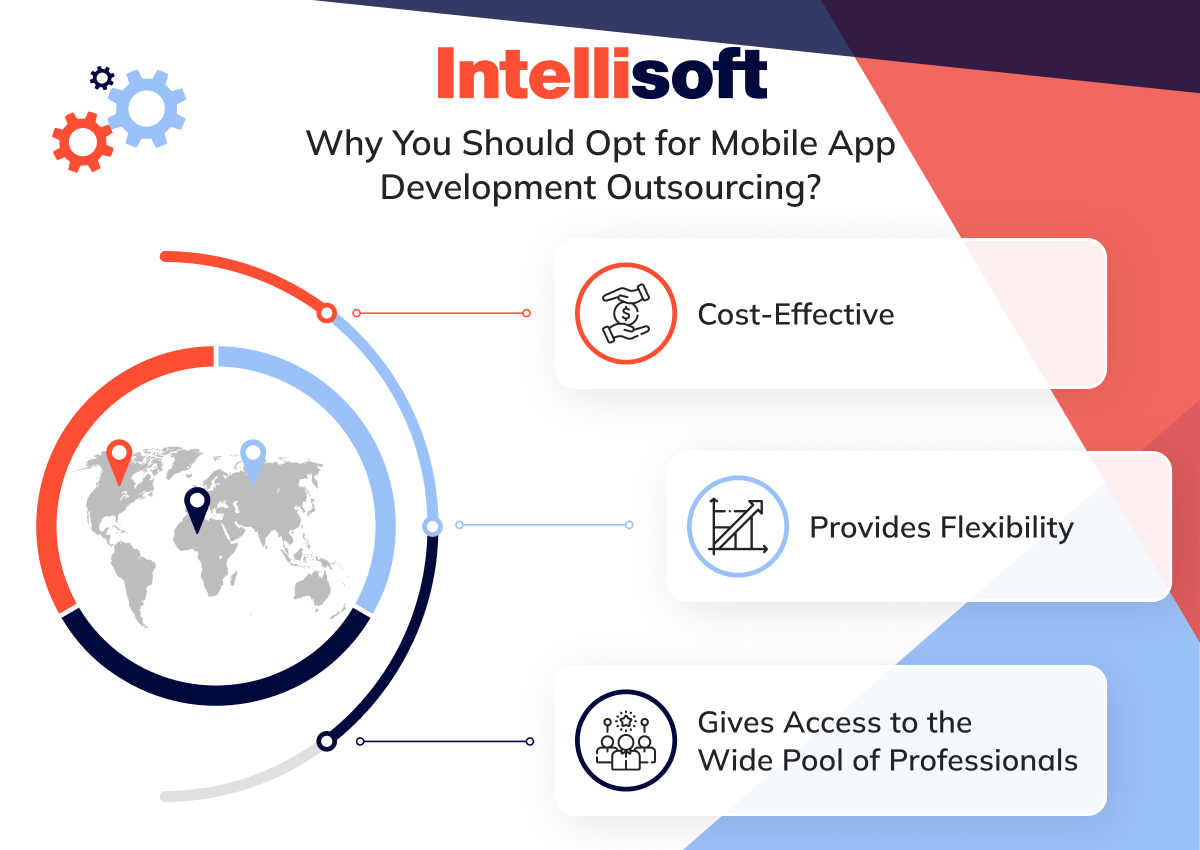
Everyone seems to know that working with developers from Ukraine, Poland, Romania, and other Eastern European countries is much cheaper than hiring engineers from the US. For instance, an app developer in the US will charge you $135/hour, while developers from Western Europe will charge around $45-90/hour. Eastern Europe outsourcing prices are even lower; expect to pay approximately $40/hour.
What are the best counties to outsource your mobile app development to? They include:
- Ukraine
- Poland
- Romania
- Bulgaria
- Moldova
- Chezh Republic
- Estonia
The number of talented mobile app development outsourcing companies in these countries is mindblowing; this can be explained by the high-quality technical education people receive and the experience of working with clients worldwide. If you’re looking for English-speaking developers with experience working with Western clients, these clients are the destinations to look at.
It Provides Flexibility
Outsourcing is all about flexibility in terms of pricing, type of cooperation, team size, and so on. Everything depends on your specific needs and requirements. Whether you seek a dedicated team for comprehensive support or individual experts for specific tasks, outsourcing adapts to your requirements, ensuring a tailored approach to meet your objectives efficiently.
You can also adjust your project’s scope, timelines, and methodologies, ensuring adaptability in the ever-evolving world of app development.
It Gives Access To A Wide Pool Of Professionals
When you outsource mobile application development, the possibility of working with top talent is endless. You’re no longer limited to a specific region – you’re free to explore the entire world, selecting engineers who are the perfect match for your specific project. Moreover, outsourcing allows you to use modern tools and technologies you might not have access to yet. Choose among experts in AI, ML, natural language processing, and other technologies, and make your app the most competitive in the market.
6 Steps to Outsource App Development with IntelliSoft
Ready to outsource your mobile app development but don’t know where to start? Worry not; we have outlined the key 6 outsourcing steps in detail. This road map will help you do everything right and ensure that your outsourcing project succeeds.
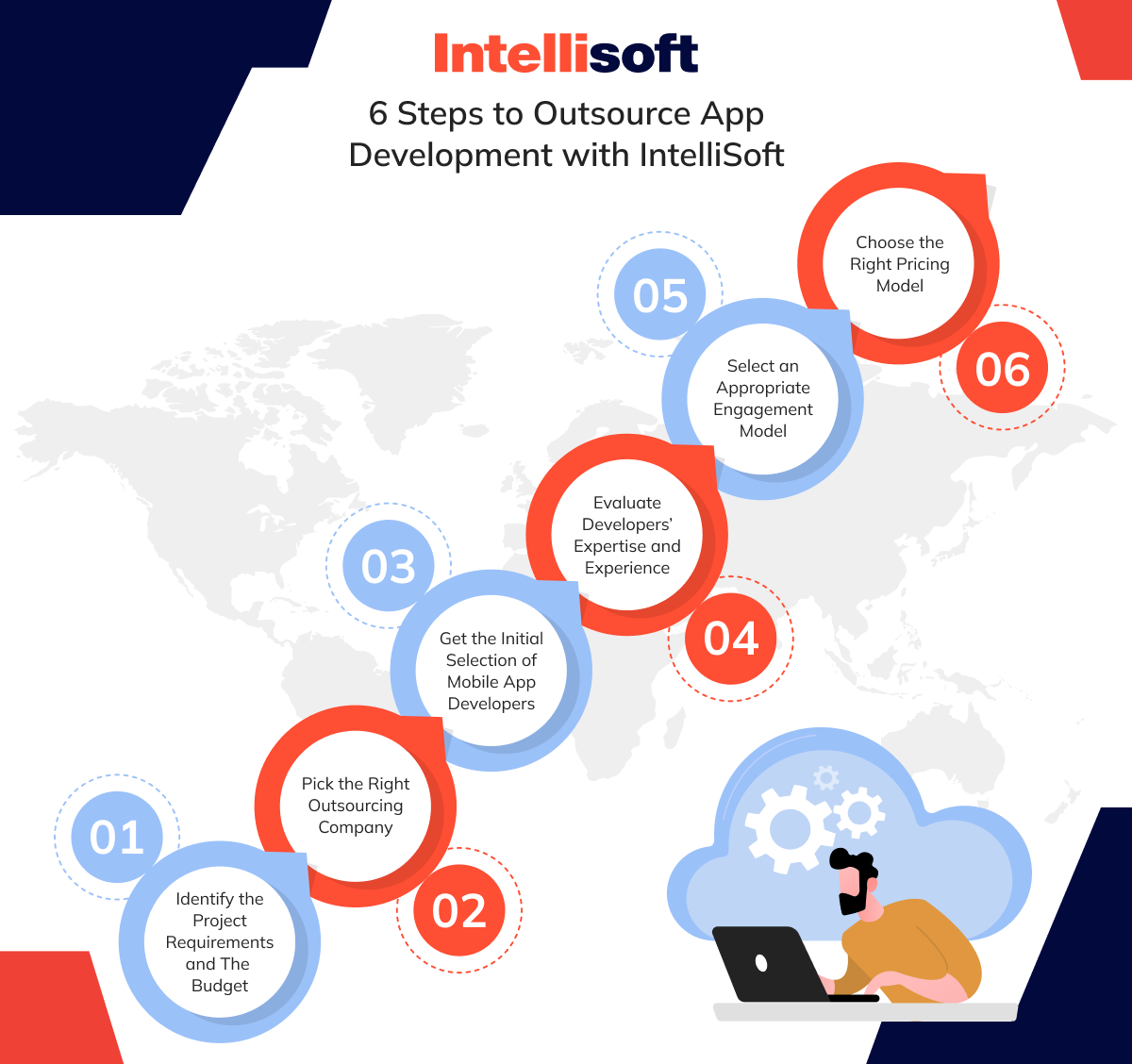
Step 1. Identify the Project Requirements and The Budget
First, you need to identify your project requirements and your budget. To do that faster and more effectively, you can use these questions to guide you:
- Resources. Do you want to outsource the entire development process or expand your in-house team?
- Objectives. Why do you want to build the app, and what do you want to achieve with it?
- Product type. Are you building an Android, iOS, or a cross-platform app?
- Target audience. Who is your target app user?
- Functionality. What are the must-have features your app should have?
- Outsourcing services. What outsourcing services will you require: only a specific part (UI/UX or writing core) or a full scale development from A to Z?
- Budget. How much are you willing to spend on outsourcing?
Step 2. Pick the Right Outsourcing Company
The next step will require you to research thoroughly to ensure that you find the one, especially considering how many outsourcing companies there are in the market. Here’s a step-by-step guide to choosing the right outsourcing partner:
- List down your requirements and needs
- Make a shortlist of candidates based on their location or services provided
- Select top candidates and check their technical and industry expertise
- Ask for references from previous clients
Step 3. Get the Initial Selection of Mobile App Developers
Begin by soliciting proposals or conducting interviews with potential outsourcing partners. Check their portfolios and capabilities to ensure they align with your project requirements. Narrow down your choices based on factors such as technical proficiency, industry experience, and cultural fit.
Step 4. Evaluate Developers’ Expertise and Experience
Here’s how to select the perfect match out of the shortlisted candidates:
- Review the CVs and portfolios to see their expertise in action
- Conduct technical interviews to check their technical skills, familiarity with relevant technologies, and past project experience
- Ask the developers to solve a simple problem with code or watch them code live
By thoroughly evaluating developers’ expertise and experience, you’ll be able to make an informed decision and choose the right team to bring your app vision to life.
Step 5. Select an Appropriate Engagement Model
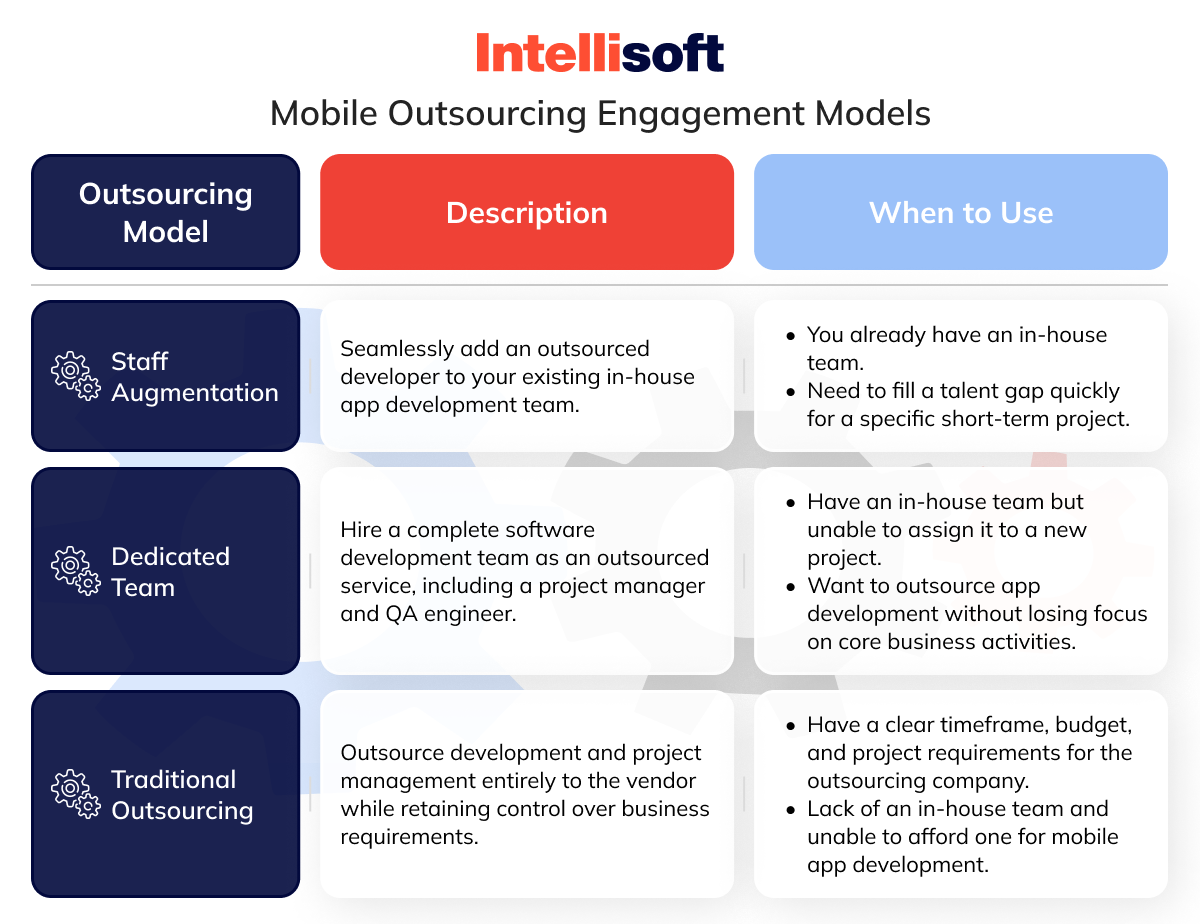
Step 6. Choose the Right Pricing Model
Finally, you need to choose the pricing model that works best for your business. There are two main pricing models: time and materials and fixed price.
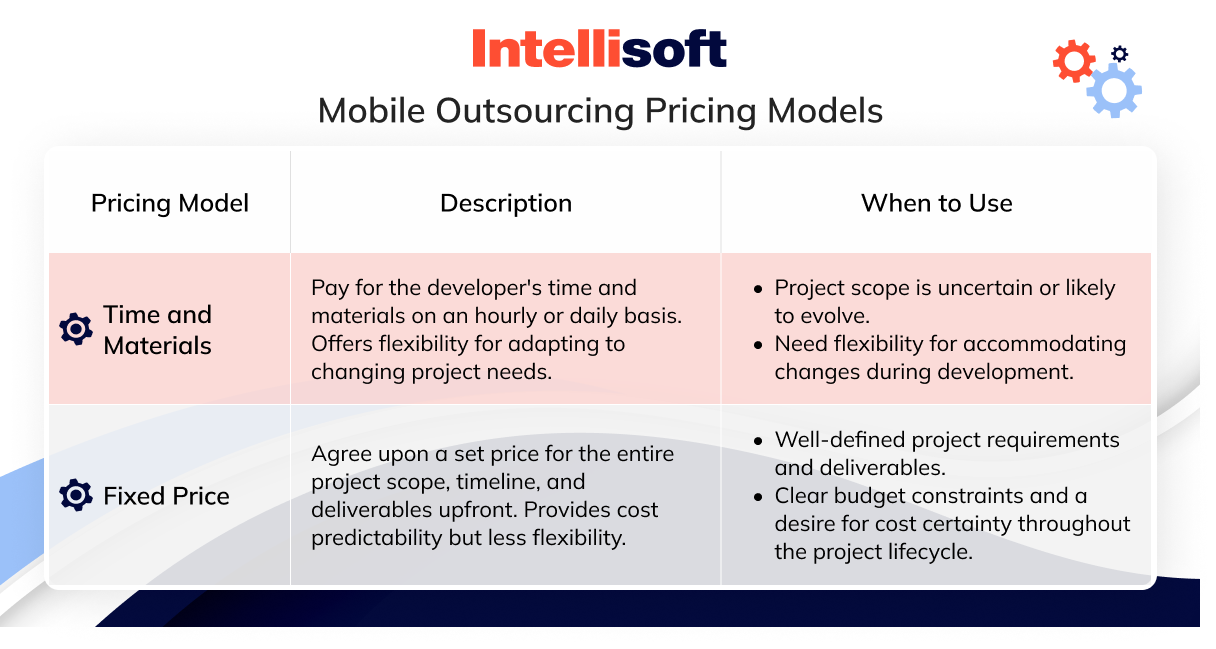
Mobile Application Development Outsourcing: Onshoring, Nearshoring, Offshoring
Outsourcing comes in three different models: onshoring, nearshoring, and offshoring. These models are based on the company’s location relative to the customer. They all involve remote work and flexible hours, but they are still different. Let’s explore why.
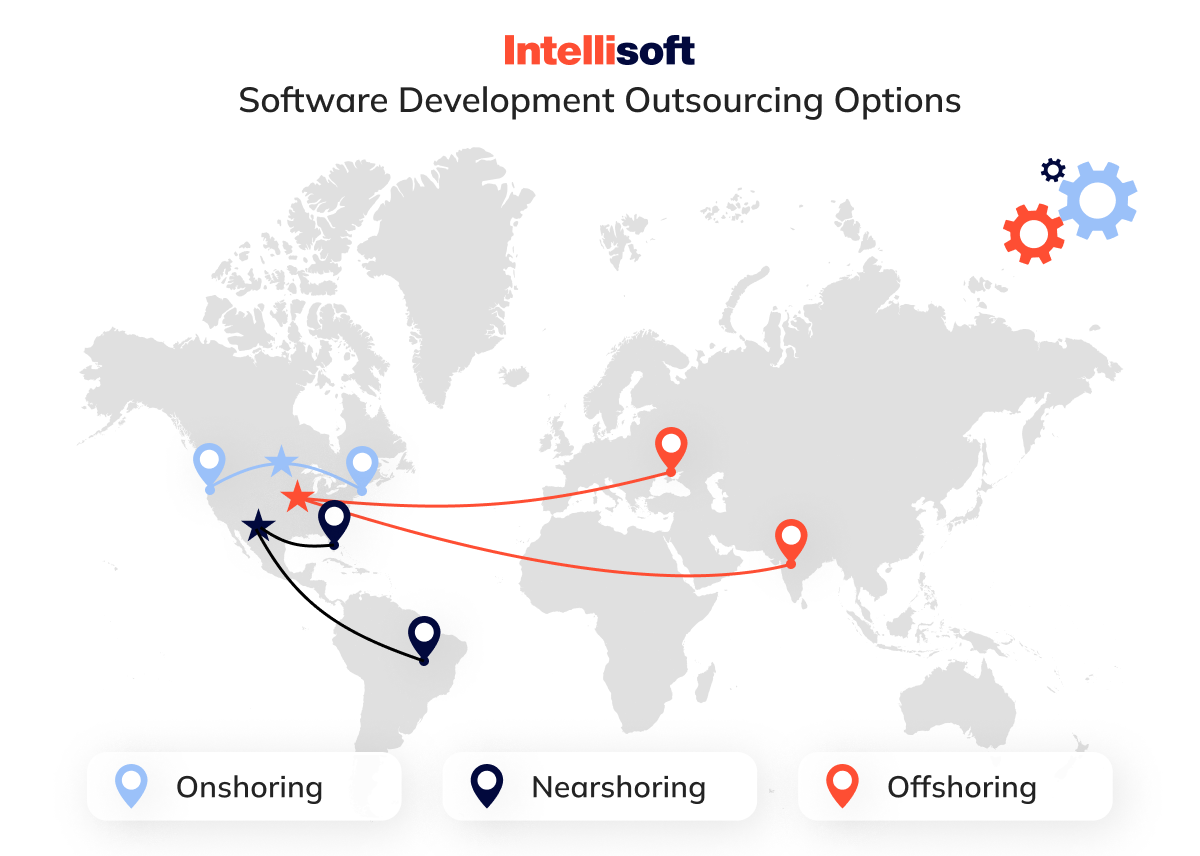
Offshoring
Offshoring involves working with an outsourcing team that is located on a different continent or just far away from you. It is the most common type of outsourcing because it is cost-effective, offers a large talent pool of professionals, and offers flexible management options.
An example of offshoring is an American country outsourcing its app development to a company in Ukraine or Poland. This is a perfect option for businesses with a limited budget but still want to receive the highest-quality services.
Are there any drawbacks of offshoring? It may cause difficulties due to the differences in language, culture, and time zones.
Nearshoring
Nearshoring involves outsourcing to a neighboring country or a region that is geographically close to your own. This model offers several advantages, including cultural similarities, overlapping time zones, and reduced language barriers compared to offshoring. By nearshoring, businesses can capitalize on cost efficiencies while maintaining a more seamless collaboration with their outsourcing partners.
Nearshoring is an attractive option for businesses seeking a balance between cost savings and effective communication and collaboration. It offers the benefits of outsourcing while minimizing some of the challenges associated with distance and cultural differences.
Onshoring
Onshoring, also known as domestic outsourcing, involves outsourcing tasks or services to a company within the same country as the client. This model prioritizes proximity and familiarity, as both parties operate within the same legal, cultural, and regulatory environment.
Onshoring offers several advantages, including reduced language barriers, minimal time zone differences, and greater regulatory compliance. Additionally, onshoring can contribute to local economies and support domestic job growth. However, it can be an expensive option, especially if you’re from the US or Western Europe.
Related Readings:
- What is Staff Augmentation? A Model to Extend Your Team
- Outsourcing vs. Outstaffing Models: What Is the Difference and Their Pros & Cons
- Everything You Need to Know About Team Extension and Dedicated Team Models
- 10 Best Countries for Hiring a Dedicated Development Team
- Pros and Cons of IT Offshoring: Benefits, Risks, and Limitations
Useful Tips for Choosing the Right Outsourcing Partner
We get it; choosing an outsourcing partner among the hundreds of providers is challenging, especially if it’s your first time outsourcing. Worry not; we have prepared seven useful tips that will help you choose the development partner and ensure that it’s a perfect match for your project.
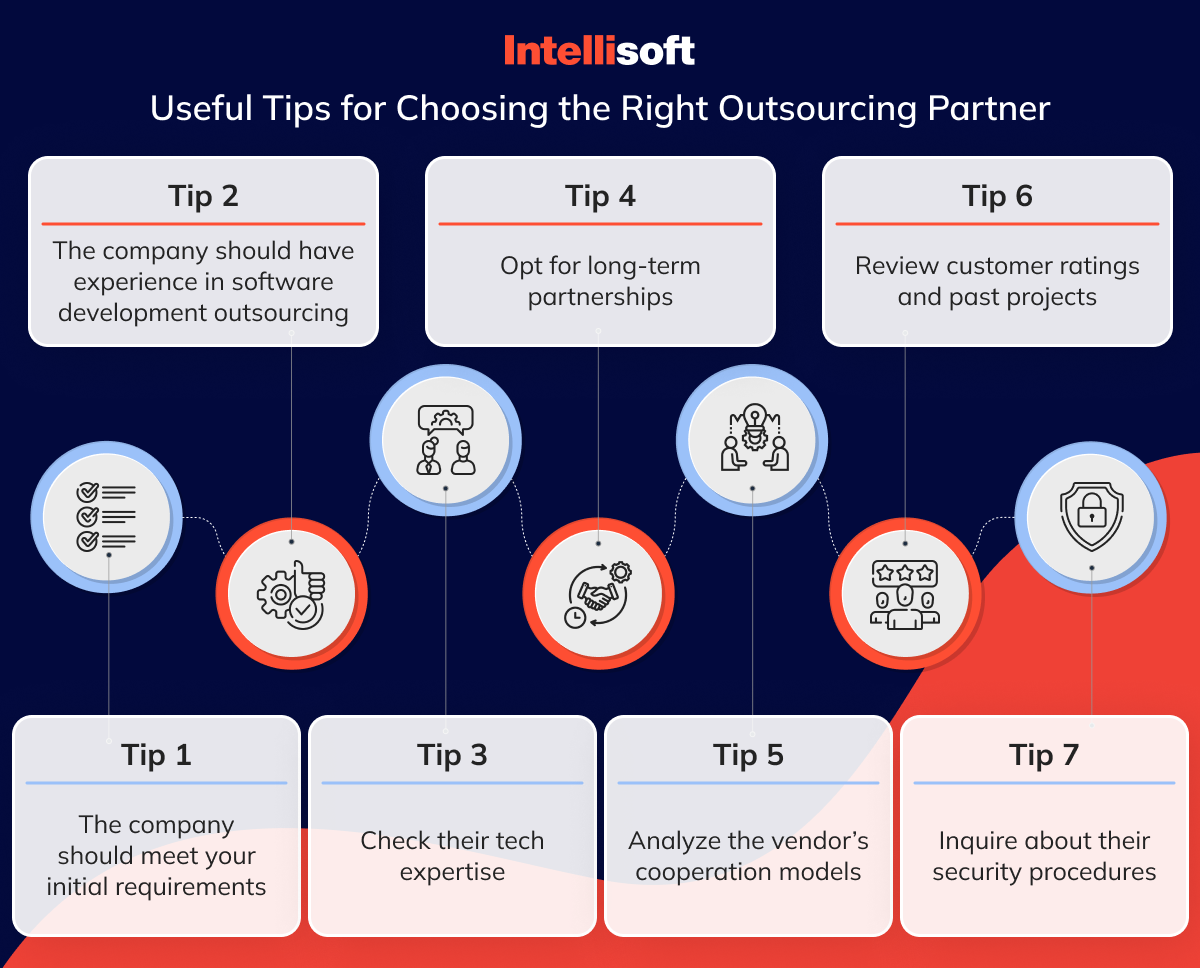
Tip 1: The company should meet your initial requirements
First, create a list of requirements for your projects and sift candidates through them, making sure that they fit those requirements. This approach will make the selection process faster and help you narrow down companies that match your requirements. Moreover, it will increase your chances of getting a product that meets your needs.
Tip 2: The company should have experience in software development outsourcing
If you’re building a mobile app, your vendor should have experience in creating mobile applications and collaborating with in-house teams. The company should have a portfolio of similar cases, demonstrating that they can handle varying requirements, meet deadlines, and work with different clients. In other words, choose an experienced vendor that has been in the market for a couple of years and has a portfolio of successful cases.
Tip 3: Check their tech expertise
Assess the outsourcing partner’s technical capabilities and expertise to ensure they align with your project requirements. Look for proficiency in relevant programming languages, frameworks, and technologies essential for mobile app development. Evaluate their track record of successfully implementing similar projects and their ability to adapt to emerging technologies. A partner with robust technical expertise can contribute to the success and innovation of your project.
Tip 4: Opt for long-term partnerships
Consider the potential for long-term collaboration when selecting an outsourcing partner. Look for a vendor who is invested in building a lasting relationship and can provide ongoing support and maintenance beyond the initial development phase. Long-term partnerships foster continuity, trust, and mutual understanding, allowing for smoother project transitions and future scalability.
Tip 5: Analyze the vendor’s cooperation models
Evaluate the outsourcing partner’s cooperation models to ensure they align with your project’s needs and preferences. Whether you prefer agile methodologies, traditional project management approaches, or a hybrid model, ensure the vendor can accommodate your preferred working style. Clear communication, flexible engagement models, and collaborative decision-making are essential for successful project execution.
Tip 6: Review customer ratings and past projects
Research the outsourcing partner’s reputation by reviewing customer ratings, testimonials, and case studies. Look for feedback from previous clients regarding the vendor’s communication, professionalism, and ability to deliver on time and within budget. Analyze past projects to assess the quality of their work, adherence to project requirements, and overall client satisfaction.
Tip 7: Inquire about their security procedures
When selecting an outsourcing partner, prioritize data security and confidentiality. Check the vendor’s security protocols, data protection measures, and compliance with industry standards and regulations. The company should have robust security policies to be able to protect sensitive information and mitigate cybersecurity risks.
Common Concerns Regarding Mobile App Development Outsourcing
Some companies are hesitant to outsource their mobile development projects because they have concerns about the process. Let’s explore the most common ones and how you can avoid these situations.
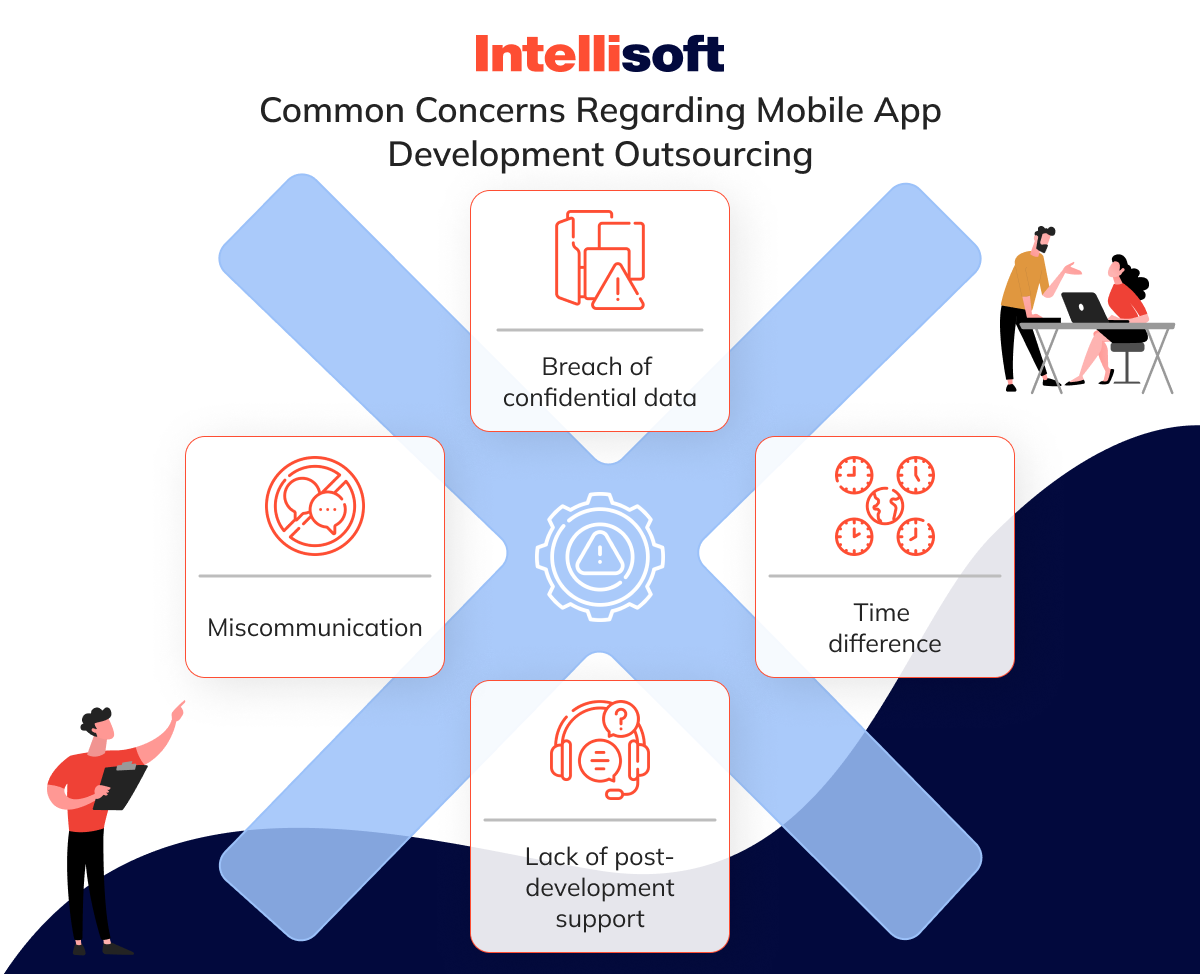
Miscommunication
One of the most common concerns with mobile app development outsourcing is miscommunication between the client and the outsourcing partner.
To avoid this issue, prioritize clear and frequent communication from the project’s outset. Establish channels for regular updates, feedback sessions, and milestone reviews to ensure alignment on project objectives, requirements, and expectations. Moreover, leverage collaboration tools and project management platforms to facilitate communication and transparency throughout development.
Time Difference
Another issue is the time difference between the in-house team and the development partner, as it can lead to management problems and missed deadlines.
To address the issues, ensure that at least a couple of hours overlap and that you have tools for asynchronous communication. Another solution is to hire teams in the same time zone or from the same country as you.
Breach of Сonfidential Data
Security breaches and data leaks pose significant risks when outsourcing mobile app development, particularly concerning sensitive information and intellectual property.
To prevent breaches of confidential data, conduct thorough due diligence when you outsource mobile app development, assessing their reputation, security protocols, and compliance with industry standards.
Moreover, NDAs should be established, and data encryption measures, access controls, and authentication mechanisms should be implemented. Regularly monitor and audit the outsourcing partner’s security practices, including network security, data storage, and employee access controls.
Lack of Post-Development Support
Concerns about insufficient post-development support can hinder the success and sustainability of mobile app development outsourcing.
To ensure adequate post-development support, define clear expectations and requirements for ongoing maintenance, updates, and support services during the contract negotiation phase. You can also negotiate an SLA that outlines the scope, duration, and terms of post-development support.
How Much Does It Cost to Outsource Mobile App Development
The cost of outsourcing mobile app development depends on multiple factors, including the type of app, the location of the team, and the features you want to include.
Some applications can cost around $10,000 and $50,000 if they have basic features and limited functionality. More advanced apps, on the contrary, will cost from $50,000 to $250,000 and more.
Here are the factors that influence the cost to outsource mobile app development:
- Complexity. The more complex the app – the higher the cost of its development. Essential apps with limited features will be less costly, while complex apps require a significant investment.
- Platform. Developing cross-platform apps for Android and iOS can be less expensive than developing apps for the two platforms separately.
- Location. Your development partner’s location is essential for final costs. Offshore destinations often offer lower hourly rates than onshore or nearshore locations, but factors such as communication barriers, time zone differences, and cultural nuances may impact overall project efficiency and costs.
- Experience. The outsourcing team’s experience and expertise also influence development costs. Highly skilled and experienced developers typically command higher rates but may deliver superior quality and efficiency, leading to cost savings in the long run.
- Design and UI/UX. Customized UI/UX design, animations, interactive elements, and user-centric features require additional time and resources, resulting in higher outsourcing costs. High-quality design and UX/UI can enhance user engagement, retention, and overall app success but may incur higher upfront development expenses.
- Testing and QA. The extent of testing required, including manual and automated testing processes, test case development, and bug fixing, influences overall development costs.
- Additional features. Custom features, third-party API integrations, backend infrastructure development, and scalability considerations add complexity and development time, leading to higher project expenses.
- Maintenance. Post-launch maintenance and support are ongoing costs associated with mobile app outsourcing. Factors such as app updates, bug fixes, performance optimization, security enhancements, and user support services contribute to maintenance expenses.
Outsource Mobile App Development to IntelliSoft
In a landscape where mobile app development demands excellence and agility, IntelliSoft stands as your strategic ally, offering a plethora of benefits to propel your business forward:
Expertise and Experience
Benefit from over 13 years of industry experience and a seasoned team adept at navigating the complexities of mobile app development across various domains. With IntelliSoft, you tap into a wealth of knowledge and expertise honed through diverse projects and challenges.
Innovation and Efficiency
Embark on your digital transformation journey with confidence, leveraging IntelliSoft’s innovative solutions and cutting-edge technology stack. Our team is committed to staying ahead of the curve, ensuring your mobile app remains at the forefront of technological innovation.
Cost-Effectiveness
Enjoy significant cost savings and enhanced efficiency by outsourcing your mobile app development projects to IntelliSoft. Whether through staff augmentation or project outsourcing, we provide access to a global talent pool, allowing you to optimize resources and achieve more within your budget constraints.
Flexibility and Scalability
Experience seamless scalability and flexibility with IntelliSoft’s outsourcing solutions. Whether you require additional resources for a short-term project or seek to expand your development team for long-term growth, our flexible engagement models cater to your evolving needs.
Quality and Reliability
Rely on IntelliSoft for superior quality and reliability in mobile app development. From stringent quality assurance processes to adherence to industry best practices, we are committed to delivering robust and dependable solutions that exceed your expectations.
Ready to partner with us and explore the full potential of mobile app outsourcing? Contact us, and let’s achieve and surpass all your business objectives.
